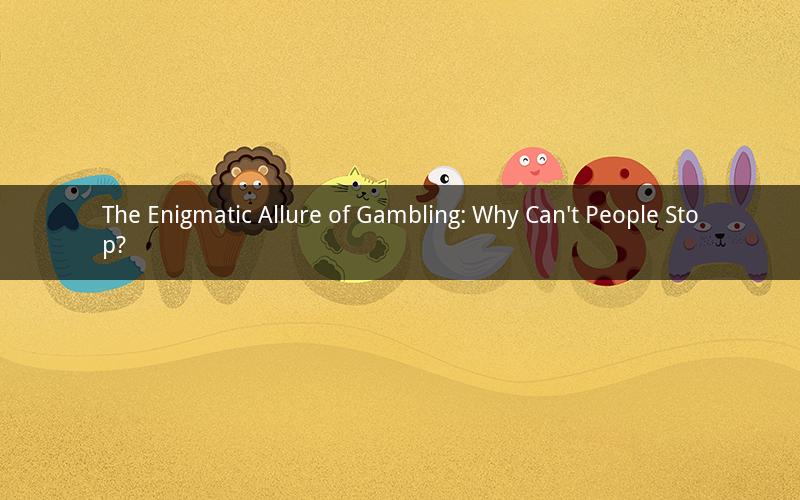
Introduction:
Gambling, an age-old pastime, has been a source of fascination and controversy alike. The allure of winning big and the thrill of the unknown continue to captivate people from all walks of life. However, despite the dangers and potential consequences, many individuals find themselves unable to stop gambling. This article delves into the reasons behind this compelling behavior and explores the psychological factors that contribute to gambling addiction.
1. The Psychology of Risk and Reward:
One of the primary reasons why people can't stop gambling is the psychological appeal of risk and reward. The human brain is wired to seek out rewards, and gambling provides an immediate and intense sense of satisfaction. The anticipation of winning big triggers the release of dopamine, a neurotransmitter responsible for pleasure and reward. This dopamine surge creates a powerful craving for more, making it difficult for individuals to resist the urge to gamble.
2. The Illusion of Control:
Another reason why gambling addiction persists is the illusion of control. Many individuals believe that they can control their gambling behavior and win back their losses. This false sense of control leads to a dangerous cycle of chasing losses, as individuals keep betting in the hope of recouping their previous winnings. The allure of potential control over the outcome of the game keeps individuals hooked, making it challenging to break free from the addiction.
3. Social and Cultural Factors:
Social and cultural factors also play a significant role in why people can't stop gambling. In many societies, gambling is seen as a form of entertainment and a way to unwind. The availability of casinos, online gambling platforms, and sports betting options makes it increasingly easy for individuals to engage in gambling activities. Additionally, the perception of gambling as a status symbol or a way to gain wealth can further fuel the desire to continue gambling.
4. Emotional and Psychological Disorders:
Gambling addiction is often associated with underlying emotional and psychological disorders. Individuals who suffer from anxiety, depression, or other mental health issues may turn to gambling as a means of escape or a way to cope with their emotions. The temporary relief and excitement provided by gambling can create a dangerous cycle, where individuals rely on gambling as a crutch to deal with their inner turmoil.
5. The Role of Advertising and Marketing:
The role of advertising and marketing cannot be overlooked when discussing why people can't stop gambling. The gambling industry invests heavily in marketing campaigns that promote the thrill and excitement of gambling. These advertisements often portray gambling as a glamorous and desirable activity, making it difficult for individuals to resist the allure. The constant exposure to these enticing messages can further exacerbate gambling addiction.
6. The Social and Economic Consequences:
Gambling addiction has significant social and economic consequences. Individuals who are unable to stop gambling may suffer from financial ruin, strained relationships, and even legal problems. The addiction can also lead to mental and physical health issues, as individuals neglect their well-being in pursuit of their gambling fix.
Questions and Answers:
Q1: What are some common signs of gambling addiction?
A1: Common signs of gambling addiction include a preoccupation with gambling, lying about gambling activities, neglecting responsibilities, borrowing money to fund gambling, and experiencing mood swings or depression when not gambling.
Q2: Can gambling addiction be treated?
A2: Yes, gambling addiction can be treated. Treatment options may include therapy, counseling, support groups, and medication. It is important for individuals struggling with gambling addiction to seek professional help and support.
Q3: How can I help someone who is struggling with gambling addiction?
A3: You can help someone struggling with gambling addiction by expressing your concern, offering support, and encouraging them to seek professional help. It is important to approach the situation with empathy and understanding, rather than judgment or criticism.
Q4: Are there any legal consequences of gambling addiction?
A4: While gambling addiction itself is not a crime, the illegal activities associated with it, such as fraud or theft, can lead to legal consequences. It is crucial for individuals to understand the legal implications of their gambling behavior and seek help before it escalates into illegal actions.
Q5: Can gambling addiction be prevented?
A5: While gambling addiction cannot be entirely prevented, there are steps individuals can take to reduce their risk. These include setting limits on gambling activities, avoiding high-risk situations, seeking support from friends and family, and being aware of the signs of addiction. Education and awareness about the risks of gambling can also play a crucial role in preventing addiction.